- Home
- Andrea Penrose
Sweet Revenge Page 16
Sweet Revenge Read online
Page 16
From outside in the alleyway, the faint rattle of a coal cart sounded. “The household will soon be stirring to life,” remarked Henning wryly. “Come around here and hold the light for me.”
The earl took up a position by the corner of the desk and lifted the lamp. “See something?”
Henning bent lower, until his lens was nearly touching the thick peppering of hair on the dead man’s chest. “Higher,” he muttered, using the probe to part a tangle of coarse curls.
The oily flame illuminated a small round bruise, less than a quarter inch in circumference, just above his breastbone. In its center was a pinprick of darker purple.
“The fellow appears to have stuck himself with his fancy piece of jewelry,” remarked Saybrook.
The surgeon canted the magnifying glass one way and then the other before replying. “Perhaps. But the contusion beneath the skin seems to indicate a tad more force was used than one would normally require for pushing a pin through linen. And as for its color . . .” He pursed his lips and shook his head after taking a closer look. “Hmmph.”
“What—”
Henning waved him to silence. “We don’t have long before the servants start to notice something is amiss.” Setting aside the probe, he skimmed a hand down to the dead man’s belly and palpated the now cold flesh. “Help me shift him, so that I can get a look at his back.”
Together they tilted the corpse forward. Saybrook steadied the body, while Henning did a quick check. “Nothing of note here,” he growled. Dropping to his knees, he lifted the man’s trouser legs. “Or here.” A pause. “He was out earlier this evening. There is mud on his shoes, and it’s still wet.”
The earl took a look. “I don’t suppose there is any way to tell from where it came?”
Henning rolled his eyes. “Bloody hell, Sandro. Do you think me a magician?”
Saybrook’s lips quirked. “As a matter of fact . . .”
A low snort, then the sound of scraping. “Hand me your handkerchief. I’ll be damned if I’m going to dirty mine.” After stuffing the folded silk into his satchel, Henning stood and shook the wrinkles from his canvas pants.
“If you have finished,” murmured the earl, “we had best get him dressed before taking our leave.”
“Right.” Henning glanced at the desk, then gingerly picked up the stickpin and wrapped it in his own pocket square. “If ye dunna mind, I’d like to take a closer look at this.”
“I was hoping you would.”
Working quickly, they managed to get the corpse dressed in some semblance of normalcy and propped back in the chair. “Leave off the damned cravat,” muttered Henning. “It’s natural that he might have removed it while sitting down to work.”
The earl nodded. “An observant eye will notice that there’s nothing natural about this, but perhaps the physician who is summoned will not care to look too closely.”
“Then you don’t mean to report this yourself?”
“Not at present, Baz,” replied Saybrook softly.
“Aye, I didn’t think so.” Henning picked up his bag. “In that case, we had better take our leave.”
The taste of the steaming chocolate—strong, sweet, and hot—helped wake Arianna’s sluggish senses. “Thank god for Theobroma cacao,” she murmured. “The life of an indolent aristocrat is harder work than I thought.”
Moving to the windows, she looked down on the back garden. The earl had chosen a charming town house for her on South Audley Street. She could almost imagine herself at home here, reading, cooking, relaxing. . . .
She spun around and set aside her empty cup. Wishful thinking made one weak. And she had made a vow to be strong.
A glance at the mantel clock showed that she had only slept for several hours since returning from the party. Saybrook could not complain if she took another interlude of rest before making her report. But in truth, she was anxious to tell him all that had happened during the evening.
Concord’s late-night visitor added yet another shadowy figure to the specters of evil. It seemed that the baron had lost little time in finding a new crony in crime after Hamilton had stuck his spoon in the wall.
Fetching a bandbox from the top shelf of the armoire, Arianna drew out an assortment of ragged garments and a floppy wool cap, along with her bag of cosmetics and face paints. It was short work to transform herself into a street urchin. Satisfied with the results, she stepped away from the cheval glass, feeling a rush of anticipation at once again having the freedom to move unnoticed through the streets of London. She didn’t envy highborn ladies, who couldn’t twitch a skirt without someone watching that the gesture conformed to the rules of propriety.
Arianna shuddered, unable to imagine living such a constricting, confining life. She, at least, could choose her own path . . . even if it led to perdition.
Saybrook had assured her that the small staff he had assembled for her were utterly trustworthy, so she didn’t worry about crossing through the pantries and exiting the house through the scullery door. It was a short walk to the earl’s town house, where she went around to the tradesmen’s entrance and was admitted by a dark-eyed maid who immediately escorted her to the kitchen.
Bianca greeted her with a broad smile and an offer of hot chocolate topped with whipped cream. “Too magro,” she clucked. “Too thin.”
“Thank you, but I would rather have coffee,” said Arianna.
“I shall have the same,” said Saybrook from the archway of the corridor. His hair was windblown and a stubbling of whiskers darkened his jaw.
“Magro, magro,” repeated Bianca, fixing him with a critical squint.
“You may bring some buttered rolls and jam as well,” he said, taking a seat at the worktable. “And perhaps some of your almond cakes. Our visitor has a very healthy appetite.”
Arianna observed the smudged shadows under his eyes. He, too, appeared to have had little sleep. “Enjoying a night of revelries, milord?”
“Only if you count dancing with death a form of entertainment.”
Her mouth went a little dry. “Good God, who? Does it have anything to do with us?”
“No one you would know,” he answered. “As for the connection, I cannot say.” He pressed his fingertips to his temples. “And before you take umbrage at that, it is because I don’t know. I may have a better idea after Henning has a chance to examine the evidence that we removed from the body. At the moment it’s unclear whether the deceased was murdered or died from natural causes.”
She made a wry face. “I take it there were no knives.”
“No knives.” His expression, however, looked a bit odd.
“What?” she pressed.
He shook his head. “It’s nothing, really. Henning sometimes has very strange notions.”
Before Arianna could ask him to elaborate, the cook approached with the coffee and a platter of food. “Buen apetito.”
Saybrook poured two cups and passed one to her. “What about your evening? Did you learn anything of note?”
“Other than the fact that Concord possesses a private collection of erotic art that would put a whore to blush?” Arianna paused for a sip of the steaming brew.
If the earl had any reaction, he hid it well.
“My discoveries may not have been as dramatic as yours, but I think you will find a few things very interesting.” She went on to recount the details of her night, from Ashmun’s probing, to Lady Spencer’s veiled innuendos, building up to Concord’s quarrel with the stranger. “And then, as I was climbing into my carriage,” she went on, “I happened to see Ashmun hiding in the bushes. He must have followed me, but it’s a mystery as to why.”
Saybrook had listened without interruption. She waited for him to speak now, but instead he picked up a pastry and took a taste.
Arianna bit back a caustic comment. The earl had some nerve to criticize her eating habits.
“These are superb,” he murmured, nudging the platter her way. “I was under the impression that you
needed sustenance in order to think properly.”
The scent of almonds tickled her nose. “And I was under the impression that you found my appetite offensive.”
“Compromise is the essence of a good battle plan.” He helped himself to a roll. “One would be a fool not to learn from one’s allies.”
She realized she was famished. “I’ve never thought you a fool, Lord Saybrook.” Arianna broke off a buttery wedge and popped it into her mouth. “An ass, but never a fool.”
He smiled and refilled her cup. “Now, tell me again about the argument.”
“As I said, I could only hear bits and snatches. The stranger was agitated, and confronted Concord with Crandall’s death and my disappearance. He seemed to feel that some deal had been broken.”
Saybrook stared meditatively into his coffee. “Try to remember exactly what was said.”
She thought for a moment. “The stranger assumed Concord was responsible for the Major’s demise and asked if the chef had been smuggled out of the country. Concord didn’t correct him, but merely said not to worry about the chef because it didn’t affect their business arrangement.”
The earl nodded for her to go on.
“But that only made the other man more angry—or rather, frightened. Grentham worried him, and he said he had a good mind to . . .” Arianna let her words trail off, just as the stranger had. “At that point they moved away to the hearth. I could only make out a word here and there.”
“Which were?” he asked, still not looking up.
Arianna wished that she could answer with something more helpful. “Blunt . . . sword blade . . . Overend . . . Gurney,” she said carefully. Seeing his brow furrow for an instant, she added, “Sorry. I did try. However, as nothing was making any sense to me, I decided to return to the drawing room. Concord joined us shortly afterward, but he seemed distracted and disappeared again. I left an hour or so before dawn, and that’s when I saw Ashmun lurking in the shadows.”
“Hmmm” was the only reply.
Reaching for the rest of the almond cake, she finished it in two quick bites, then dusted the crumbs from her fingertips. “Why, Bianca has added morsels of chocolate to the cake,” she suddenly exclaimed, wondering how she had missed it on the first taste. “Brilliant.”
“Yes, isn’t it?” murmured Saybrook abstractly.
“Sorry I can’t offer you more. Hell, a blunt sword blade isn’t much of a clue.” She made a wry face. “Perhaps they are trading in military supplies.”
“An interesting thought.” The earl began to drum his fingers on the knife-scarred maple. “A pity you didn’t hear the fellow’s name.”
“Concord seemed loath to introduce us,” she replied. “He didn’t—No, wait. He did! Say his name, that is.” Squeezing her eyes shut, Arianna replayed the encounter in her mind. “Cotter . . . Calvin . . . Kelling . . .” Her lids flew open. “Kellton. It was Kellton.”
The drumming stopped. “Describe him.”
“Heavyset, medium height, fair hair with a bald spot at the crown,” she answered. “His face was ruddy, as if he had spent time in the sun.”
“Dio Madre,” he muttered, his leg buckling slightly as his feet hit the floor.
“What?” cried Arianna, alarmed by the sudden shift into action.
“It appears, Lady Arianna, that you were one of the last people to see my corpse alive.”
14
From the chocolate notebooks of Dona Maria Castellano
Sandro will be pleased to learn that chocolate finally arrived in England by the mid-seventeenth century. I find it interesting that coffee from the Middle East and tea from the Orient arrived around the same time. Chocolate was the most expensive of the three, but it still became popular, especially among the elite of London, despite the cost. Samuel Pepys, the great chronicler of his time, makes regular mention in his famous diaries of drinking chocolate. . . .
Chocolate Angel Food Cake
½ cup all-purpose flour
½ cup unsweetened cocoa powder, plus more for dusting
1½ cups sugar, divided
½ teaspoon salt, divided
12 large egg whites (1½ cups), at room temperature
30 minutes
1 tablespoon fresh lemon juice
1 teaspoon pure vanilla extract
1. Preheat oven to 350°F with rack in middle.
2. Sift together flour, cocoa powder, ¾ cup sugar, and ¼ teaspoon salt.
3. Beat egg whites with lemon juice, vanilla, and remaining ¼ teaspoon salt using an electric mixer on medium-high speed until they just hold soft peaks. With mixer on high speed, add remaining ¾ cup sugar in a slow stream and beat until whites hold stiff, glossy peaks, 3 to 5 minutes.
4. Sift flour mixture over whites and beat on low speed until just blended (folding in any unblended flour mixture by hand if necessary).
5. Spoon batter into ungreased tube pan and smooth top. Run a rubber spatula or long knife through batter to eliminate any large air bubbles.
6. Bake until a wooden pick inserted into middle of cake comes out clean, 40 to 45 minutes. Remove from oven and immediately invert pan. If pan has “legs,” stand it on those. Otherwise, place pan over neck of a wine bottle. Cool cake completely, upside down, 1 to 1½ hours. Turn pan right side up. Run a knife around edge and center tube of pan. Lift cake, still on bottom of pan, then run a knife under bottom of cake to loosen. Invert to release cake from tube, then reinvert onto a plate. Dust lightly with cocoa powder.
7. Serve with vanilla yogurt or lightly sweetened whipped cream, and fresh berries.
“Good God, surely you don’t think that I had anything to do with his death,” exclaimed Arianna. The earl didn’t respond to her question. “This changes everything,” he muttered, more to himself than to her. “I had better go inform Henning immediately.”
He turned for the doorway . . . and nearly collided with a man rushing in from the stairwell.
“Auch, I was hoping to find you at home,” said the newcomer. He was nearly as gaunt as the earl, but stood a head shorter. The contrast didn’t stop there. Dark and Light. In contrast to Saybrook’s olive complexion and jet-black hair, the fellow had sandy locks, now liberally threaded with silver, and fair skin.
A Northern warrior, thought Arianna, spying the jagged scars sliced on his brow and cheek.
The heavy Scots burr confirmed the surmise. “Yer housekeeper said ye were engaged in a private meeting, but I assured her that ye wuddna mind the invasion.”
Arianna saw him slant a sidelong glance her way.
“I take it this laddie is yer lady.”
“Lady Arianna, allow me to introduce Basil Henning, former surgeon to the Third Regiment of His Majesty’s Dragoons,” said Saybrook. “Baz, this is indeed our master of disguise.”
Lamplight winked off his spectacles as Henning subjected her to a lengthy stare. “Ye make a very fetching male, milady.”
“Thank you,” she murmured. “I think.”
“You’ve saved me the bother of traipsing through St. Giles to find you,” said Saybrook without further preamble. “I’ve some important news—”
“As do I, Sandro,” interrupted the surgeon.
The two men locked gazes, and Arianna sensed that they did not need words to communicate.
“Very well, you first,” said the earl, resuming his seat. “Would you like some coffee? Or chocolate?”
“I’d rather have good Highland malt, but as I know ye only have Spanish brandy, I’ll settle for that.” Heaving a sigh, Henning fetched the bottle and poured a generous splash of the spirits. “Slainte Mhath, milady.”
“Baz,” began Saybrook.
“A man must remember his manners,” replied the surgeon before quaffing another long swallow. “Ahhh, now I feel a touch more civilized.”
The earl said something under his breath that drew a hoot of laughter from his friend.
“Hold yer water, Sandro,” said the surgeon, once his amusement had died away. “Af
ter running me ragged all night, ye could at least have the courtesy to allow me a wee dram.”
“Baz.”
“Oh, very well.” The impish grin gave way to a more sober expression. Drawing three small vials from his coat pocket, he carefully stood them in a tight row on the table. “Take a good look at these.” The first appeared to contain a clear liquid, the second was colored a deep Prussian blue, and the third cadmium red.
“I take it we are not here to admire a new formula for watercolor pigment,” said Saybrook dryly.
“No, not pigment.” Henning placed another item on the table.
In the lamplight, it seemed to glow with an inner fire. . . .
“Don’t touch it!”
Arianna jerked back her hand. “I wasn’t about to steal it, Mr. Henning.”
“Yer pardon, milady. But I didna want ye to prick yer finger.”
“I’m not some delicate English rose. I don’t wilt at a mere touch.”
“Trust me, ye might shrivel up and die from that thorn,” he growled. “I canna be sure that I’ve removed all the poison, so I would rather be safe than sorry.”
Poison. For an instant, she felt a little light-headed. First the Prince, and now . . .
Saybrook frowned. “So you were right in your suspicions?”
“Aye,” replied Henning. “The froth of his spittle and the clawing of his hands indicated an unnatural death, as did the color of the contusion on the victim’s chest. That was the key clue. I suddenly recalled where I had read about a magenta aureole around the purple and green of a normal bruise—it’s very distinctive and very rare. So I decided to make a few tests.” He sat back with a look of grim satisfaction. “And you’ll never guess what I discovered.”
“I’m in no mood for playing parlor games, Baz,” replied the earl. “Like Lady Arianna, I’ve had precious little sleep, so kindly get to the point.”

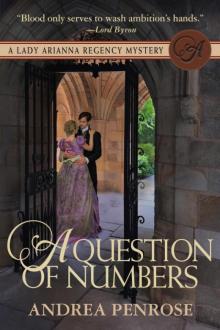 A Question of Numbers
A Question of Numbers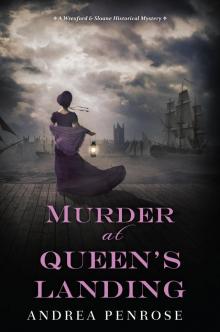 Murder at Queen's Landing
Murder at Queen's Landing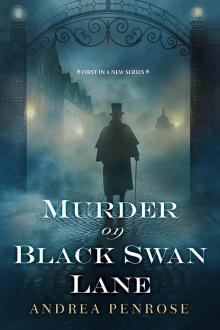 Murder on Black Swan Lane
Murder on Black Swan Lane Sweet Revenge
Sweet Revenge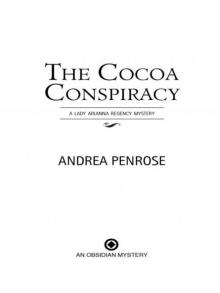 The Cocoa Conspiracy
The Cocoa Conspiracy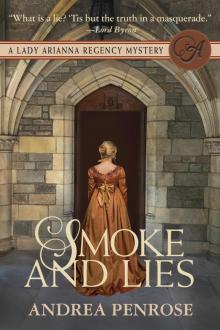 Smoke & Lies
Smoke & Lies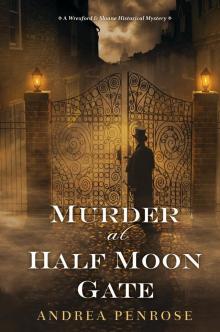 Murder at Half Moon Gate
Murder at Half Moon Gate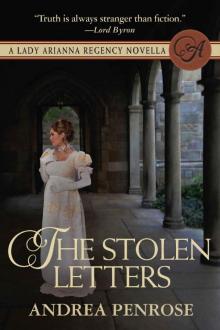 The Stolen Letters
The Stolen Letters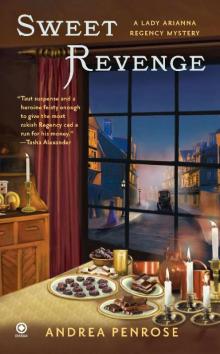 Sweet Revenge lahm-1
Sweet Revenge lahm-1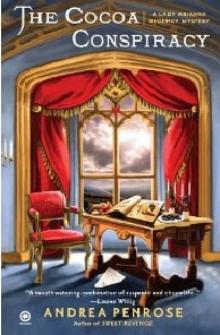 The Cocoa Conspiracy lahm-2
The Cocoa Conspiracy lahm-2